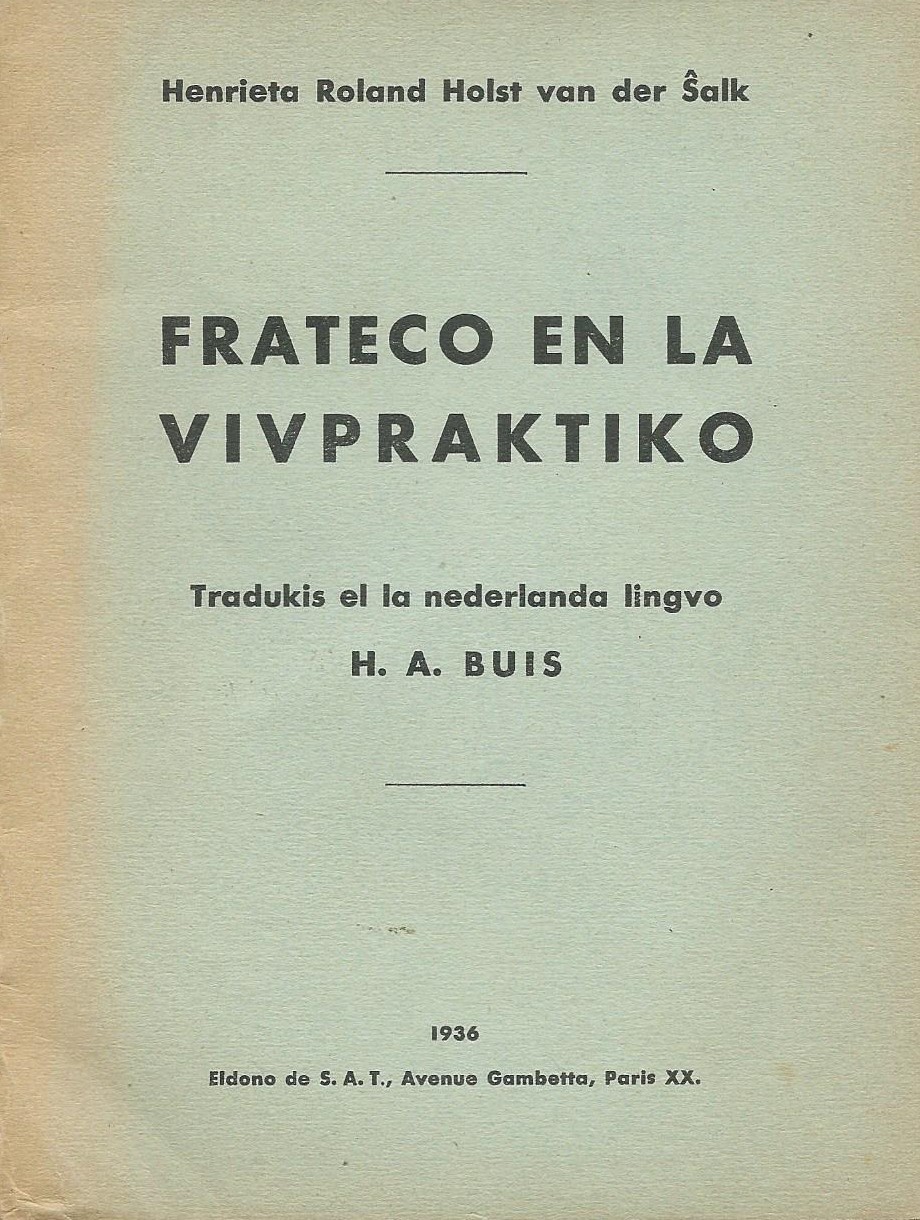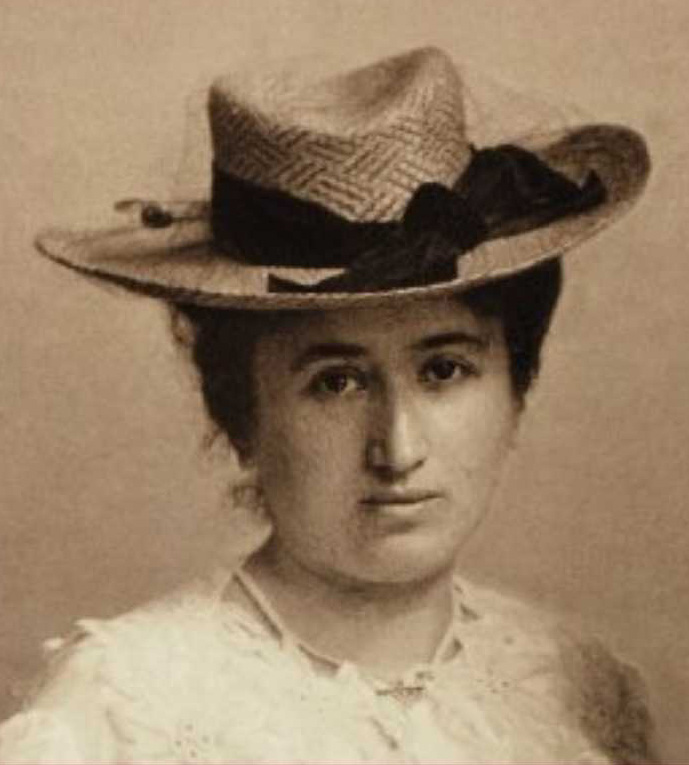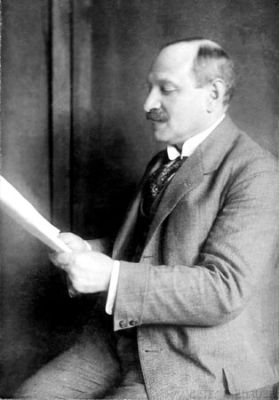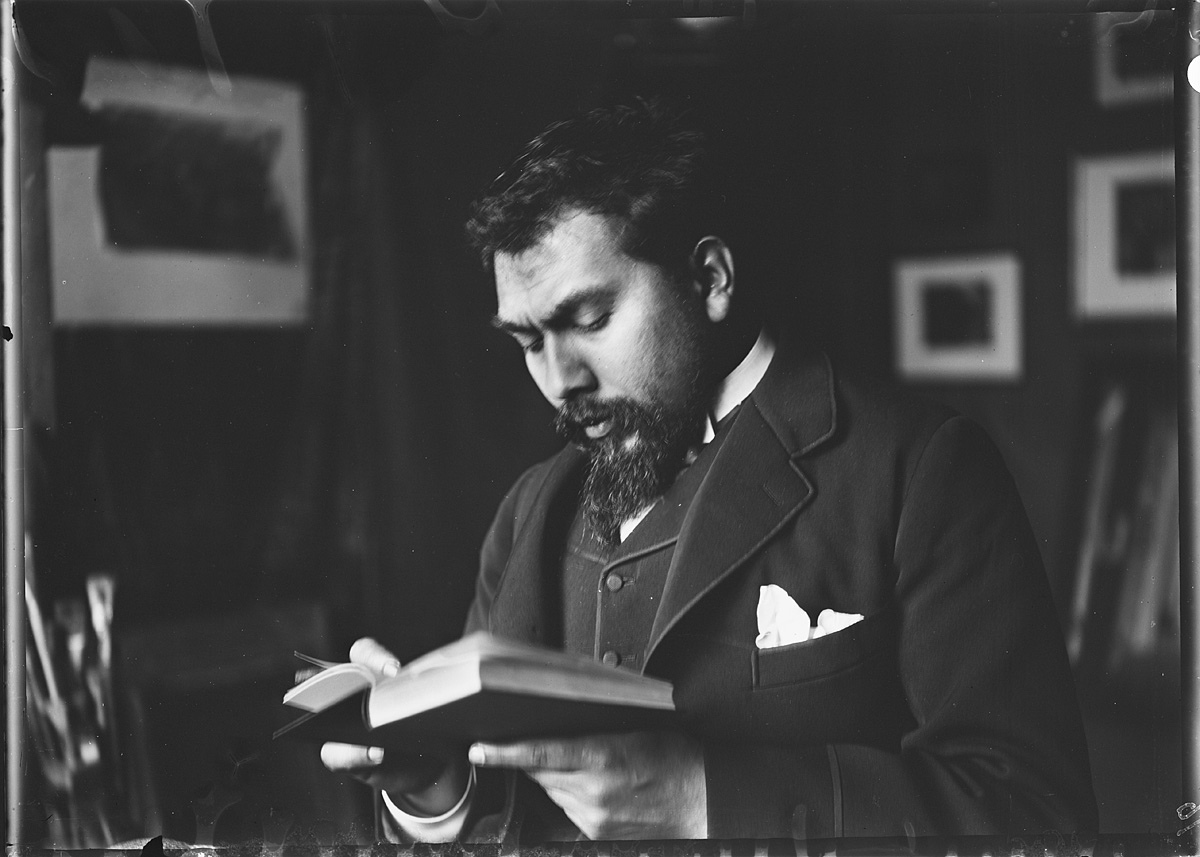|
Henriëtte Roland Holst
Henriette Goverdine Anna "Jet" Roland Holst-van der Schalk (24 December 1869 – 21 November 1952) was a Dutch poet and Council communist. She was nominated for the Nobel Prize in Literature. She had many noted relatives. Her husband was the artist Richard Roland Holst. The poet Adriaan Roland Holst (1888–1976), nicknamed "the Dutch Prince of Poets", was the nephew of her husband. Early life Born in Noordwijk on 24 December 1869, Roland Holst was brought up in the affluent, liberal Christianity, liberal Christian family of the notary Theodore Willem van der Schalk and Anna Ida van der Schalk-van der Hoeven. Roland Holst attended four years of boarding school in Velp, Gelderland, Velp and studied French in Liège, Liege. Roland Holst soon came to develop a talent as a poet. She married the artist Richard Roland Holst in 1896 and befriended the poet Herman Gorter, who prompted her to read ''Das Kapital'' by Karl Marx. Around this time she became politics, politically active and ... [...More Info...] [...Related Items...] OR: [Wikipedia] [Google] [Baidu] |
Michel De Klerk
Michel de Klerk (24 November 1884, Amsterdam – 24 November 1923, Amsterdam) was a Dutch architect. Born to a Jewish family, he was one of the founding architects of the movement Amsterdam School (Expressionist architecture) Early in his career he worked for other architects, including Eduard Cuypers. For a while, he also employed the Indonesian-born Liem Bwan Tjie, who would later become his country's pioneering proponent of the Amsterdam School and modern architecture. Of his many outstanding designs, very few have actually been built. One of his finest completed buildings is ' Het Schip' (The Ship) in the Amsterdam district of Spaarndammerbuurt. Amsterdam West Eigen Haard (Own Hearth), working-class Socialist housing, consisting of three groups of buildings: *(1) Spaarndammerplantsoen, North side (1913–1915) *(2) Spaarndammerplantsoen, South side (1915–1916) *(3) ' Het Schip', Zaanstraat / Oostzaanstraat / Hembrugstraat (1917–1920) Luchtfoto Spaarndammerplant ... [...More Info...] [...Related Items...] OR: [Wikipedia] [Google] [Baidu] |
Das Kapital
''Capital: A Critique of Political Economy'' (), also known as ''Capital'' or (), is the most significant work by Karl Marx and the cornerstone of Marxian economics, published in three volumes in 1867, 1885, and 1894. The culmination of his life's work, the text contains Marx's analysis of capitalism, to which he sought to apply his theory of historical materialism in a critique of political economy, critique of classical political economy. 's second and third volumes were completed from manuscripts after Marx's death in 1883 and published by Friedrich Engels. Marx's study of political economy began in the 1840s, influenced by the works of the classical political economists Adam Smith and David Ricardo. His earlier works, including ''Economic and Philosophic Manuscripts of 1844'' and ''The German Ideology'' (1846, with Engels), laid the groundwork for his theory of historical materialism, which posits that the Base and superstructure, economic structures of a society (in par ... [...More Info...] [...Related Items...] OR: [Wikipedia] [Google] [Baidu] |
Leon Trotsky
Lev Davidovich Bronstein ( – 21 August 1940), better known as Leon Trotsky,; ; also transliterated ''Lyev'', ''Trotski'', ''Trockij'' and ''Trotzky'' was a Russian revolutionary, Soviet politician, and political theorist. He was a key figure in the 1905 Revolution, October Revolution of 1917, Russian Civil War, and the establishment of the Soviet Union, from which he was exiled in 1929 before Assassination of Leon Trotsky, his assassination in 1940. Trotsky and Vladimir Lenin were widely considered the two most prominent figures in the Soviet state from 1917 until Death and state funeral of Vladimir Lenin, Lenin's death in 1924. Ideologically a Marxist and a Leninist, Trotsky's ideas inspired a school of Marxism known as Trotskyism. Trotsky joined the Russian Social Democratic Labour Party in 1898, being arrested and exiled to Siberia for his activities. In 1902 he escaped to London, where he met Lenin. Trotsky initially sided with the Mensheviks against Lenin's Bolsheviks in ... [...More Info...] [...Related Items...] OR: [Wikipedia] [Google] [Baidu] |
Rosa Luxemburg
Rosa Luxemburg ( ; ; ; born Rozalia Luksenburg; 5 March 1871 – 15 January 1919) was a Polish and naturalised-German revolutionary and Marxist theorist. She was a key figure of the socialist movements in Poland and Germany in the early 20th century. Born to a Jewish family in Congress Poland, then part of the Russian Empire, Luxemburg became involved in radical politics at an early age via the Proletariat (party), Proletariat party, and fled to Switzerland in 1889. She helped found the Social Democracy of the Kingdom of Poland and Lithuania (SDKPiL) party in 1893, and in 1897 was awarded a Doctor of Law in political economy from the University of Zurich, becoming one of the first women in Europe to do so. In 1898, Luxemburg moved to Germany, and soon became a leading figure in the Social Democratic Party of Germany (SPD). Her political activities included teaching Marxist economics at the party's training school. Luxemburg was imprisoned several times, including in Germany ... [...More Info...] [...Related Items...] OR: [Wikipedia] [Google] [Baidu] |
Karl Liebknecht
Karl Paul August Friedrich Liebknecht (; ; 13 August 1871 – 15 January 1919) was a German politician and revolutionary socialist. A leader of the far-left wing of the Social Democratic Party of Germany (SPD), Liebknecht was a co-founder of both the Spartacus League and Communist Party of Germany (KPD) along with Rosa Luxemburg. Liebknecht was born in Leipzig as the son of SPD co-founder Wilhelm Liebknecht, and studied law and political economy. In 1907, he was imprisoned a year for writing an anti-militarism pamphlet, and in 1912 was elected to the Reichstag (German Empire), Reichstag. After the start of World War I, he vehemently opposed the SPD's support for the German war effort, co-founding the Spartacus League and beginning to call for revolution. Liebknecht was expelled from the party for his views in 1916, and again imprisoned for leading an anti-war demonstration. In 1917, the Spartacus League joined the Independent Social Democratic Party of Germany, Independent Soci ... [...More Info...] [...Related Items...] OR: [Wikipedia] [Google] [Baidu] |
Second International
The Second International, also called the Socialist International, was a political international of Labour movement, socialist and labour parties and Trade union, trade unions which existed from 1889 to 1916. It included representatives from most of Europe's major working-class organizations, though was dominated by the Social Democratic Party of Germany. The international continued the work of the International Workingmen's Association, First International, which had dissolved in 1876. It was ideologically dominated by Marxism, although other viewpoints were represented, notably anarchism before the anarchists were expelled in 1896. Leading theorists within the Second International included Friedrich Engels, Karl Kautsky, and Georgi Plekhanov, as well as Vladimir Lenin and Rosa Luxemburg. The Second International was primarily concerned with developing and coordinating strategy and tactics, and with establishing common policies for its member parties. Congress meetings were hel ... [...More Info...] [...Related Items...] OR: [Wikipedia] [Google] [Baidu] |
Henriëtte Roland Holst
Henriette Goverdine Anna "Jet" Roland Holst-van der Schalk (24 December 1869 – 21 November 1952) was a Dutch poet and Council communist. She was nominated for the Nobel Prize in Literature. She had many noted relatives. Her husband was the artist Richard Roland Holst. The poet Adriaan Roland Holst (1888–1976), nicknamed "the Dutch Prince of Poets", was the nephew of her husband. Early life Born in Noordwijk on 24 December 1869, Roland Holst was brought up in the affluent, liberal Christianity, liberal Christian family of the notary Theodore Willem van der Schalk and Anna Ida van der Schalk-van der Hoeven. Roland Holst attended four years of boarding school in Velp, Gelderland, Velp and studied French in Liège, Liege. Roland Holst soon came to develop a talent as a poet. She married the artist Richard Roland Holst in 1896 and befriended the poet Herman Gorter, who prompted her to read ''Das Kapital'' by Karl Marx. Around this time she became politics, politically active and ... [...More Info...] [...Related Items...] OR: [Wikipedia] [Google] [Baidu] |
Jan Toorop
Johannes Theodorus "Jan" TooropJan Toorop Netherlands Institute for Art History, 2014. Retrieved on 18 February 2015. (20 December 1858 – 3 March 1928) was a Dutch painter who worked in various styles, including Symbolism (arts), Symbolism, Art Nouveau, and Pointillism. His early work was influenced by the Amsterdam Impressionism movement. Biography Johannes Theodorus Toorop was born on 20 December 1858 in Purworejo Regency, Purworejo on the island of Java (island), Java in the Dutch East Indies (present-day Indonesia). His father was Christoffel Theodorus Toorop, a civil servant, and his mother was Maria Magdalena Cooke. B. H. Spaanstra-Polak[...More Info...] [...Related Items...] OR: [Wikipedia] [Google] [Baidu] |
De Nieuwe Gids
(from Dutch: ''The New Guide'') was a Dutch illustrated literary periodical which was published from 1885 to 1943. It played an important role in promoting the literary movement of the 1880s. Its contents covered a wide range of topics, extending to developments in science. History and profile Around 1880, a group of young writers in Amsterdam, dissatisfied with the existing conservative literary climate, founded the group Flanor, also known as the Tachtigers, and began publishing ''De Nieuwe Gids'' as a vehicle for their work. The first issue appeared on 1 October 1885. The title ''The New Guide'' was intended as a sarcastic anti-tribute to Amsterdam's prevailing literary journal, ''De Gids'' (''The Guide''), which the Tachtigers viewed as old-fashioned and didactic, and which had persistently rejected their submissions. Two of the founding editors and frequent contributors to ''The New Guide'' were the poet and critic Willem Kloos, and the poet, novelist, playwright, essayis ... [...More Info...] [...Related Items...] OR: [Wikipedia] [Google] [Baidu] |
Tachtigers
The Tachtigers ("Eightiers"), otherwise known as the Movement of Eighty (), were a radical and influential group of Dutch writers who developed a new approach in 19th-century Dutch literature. They interacted and worked together in Amsterdam from the 1880s. Many of them are still widely read today. The Tachtigers were so named simply because they became active around the year 1880. The movement was based on revolt against what the Tachtigers perceived as the formalistic and overly wrought style of mainstream literature in their day, particularly as favored by the predominant literary journal in Amsterdam, ''De Gids'' (''The Guide''). The Tachtigers instead insisted that style must match content, and that intimate and visceral emotions can only be expressed using an intimate and visceral writing style. For guidance in this effort, they tended to draw inspiration from Shakespeare, and from the then recent Impressionist painters and Naturalist writers. After ''De Gids'' continued t ... [...More Info...] [...Related Items...] OR: [Wikipedia] [Google] [Baidu] |
Willem Kloos
Willem Johannes Theodorus Kloos (; 6 May 1859 – 31 March 1938) was a nineteenth-century Dutch poet and literary critic. He was one of the prominent figures of the Movement of Eighty and became editor in chief of '' De Nieuwe Gids'' after the editorial fracture in 1893. He was nominated for the Nobel Prize in Literature five times. Biography Kloos was one of the leaders, along with the poet Herman Gorter, the critic Lodewijk van Deyssel, and the prolific writer and psychiatrist Frederik van Eeden, of the influential group of Dutch writers known as the Movement of Eighty (Beweging van Tachtig), otherwise known simply as the Tachtigers, who interacted and worked with each other in Amsterdam in the 1880s. As part of this movement, Kloos criticized mainstream literary style as bookish and overly wrought, and instead sought to write poetry in which the form matched the content, so that intimate experiences should be conveyed with a natural intimacy of expression. Kloos also reject ... [...More Info...] [...Related Items...] OR: [Wikipedia] [Google] [Baidu] |
Albert Verwey
Albert Verwey (May 15, 1865 – March 8, 1937) was a Dutch poet belonging to the " Movement of Eighty". As a translator, staffer, and literary historian he played an important role in the literary life of The Netherlands in the late 19th and early 20th centuries. Verwey was born in the center of Amsterdam; all his life he spoke with a strong local accent. Both his father and grandfather were furniture makers. In his youth, he lost both his parents, caused by tuberculosis. Verwey began to write poetry early in life. In 1880 he translated poems by Samuel Coleridge, Byron, Shelley, and Wordsworth. After finishing high school Verwey worked at a securities office. Because Verwey was very good in English, the 18-years-old Verwey was invited by the Dutch directors of the Maxwell Land Grant to join them as translator to Cimarron, New Mexico. His first book of poems, called Persephone after the Greek goddess, was published in 1883. In 1885 he was a co-founder of the periodical De Nieuw ... [...More Info...] [...Related Items...] OR: [Wikipedia] [Google] [Baidu] |








